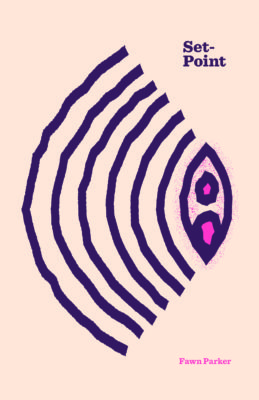Early on in her debut novel, Set-Point, Fawn Parker’s narrator Lucy wonders about a writer named Marcus’s opinion of her body. Does her eating disorder make her hot, or is her thinness “a neutral effortless thing” to him? “The concept of effortlessness seemed hilarious,” Lucy notes, after enduring a lackluster sex act, leaving his apartment, and vomiting messily in the restaurant below. Likewise, Set-Point might seem effortless in its easy, acerbic veneer, and the affectlessness of its language might be confused for a kind of apathetic neutrality, but to mistake it for either is to be the butt of the book’s joke. Parker is here to remind us: nothing is easy.
Parker is a Concordia grad who is maybe best known for her work as a co-founder of the terrifyingly hip online lit mag Bad Nudes. Set-Point – which might be autofiction or autofiction-adjacent; alt-lit or alt-lit-adjacent – is about a woman whose creative writing thesis is four sitcom episodes: Knausgård’s My Struggle re-enacted by way of Seinfeld. Mashing up two autofictional oeuvres about nothing adds up to – what? Parker excerpts the scripts so we can judge for ourselves. Marcus, too, reads them, and explains to Lucy – who generally disguises herself with laconic self-deprecation, in the rare case that men get past her looks – that sending the scripts to publishers would be like bringing “an art project home from school and ask[ing] your parents to hang it on the fridge.” He doesn’t imply that they were easy for her to write, but he does imply they are inadequate. She should focus on something serious, like a novel.

Set-Point
Fawn Parker
ARP Books
$20.00
paper
248pp
9781927886250
Lucy’s inadequacies aren’t glossed, either. Her incompetence in dealing with a mystery rash – eczema? psoriasis? – is only matched by her inventiveness: she does everything to deal with it except actually, you know, go to the doctor. In fact, the rash presents a strong argument against effort – which disturbs the unknown and all its reassuring neutrality, and is liable to force some kind of change or outcome. In making a serious effort, the rash reminds us, the artist risks failing.
Ultimately, Parker makes an unexpected, necessary swerve to this end, as her Künstlerroman exhausts its ennui of self-harm and falls earnestly into, yes, caring. Lucy’s mother’s cancer has been present throughout the book, and her mortality is a wavering dimension that makes Lucy’s ambition and loneliness matter a lot, and not at all, depending on the angle. Parker’s talent makes writing a novel look easy – Lucy’s daily drags around Montreal are an elaborate, entertaining, ironic simulation on par with Seingård or the sexual labour she’s selling – but Set-Point aspires to more than effortless neutrality. In risking sentiment, it succeeds. mRb






0 Comments